#golemania
Text
BLOGTOBER 10/6/2022 - GOLEMANIA! PT 1: DER GOLEM - HOW HE CAME INTO THE WORLD
For Blogtober 10/6 and 10/7, I examined two films about Jewish mysticism, both made by non-Jews, both long unavailable (or simply not available enough), and both fine examples of the style and visual capabilities of their times.
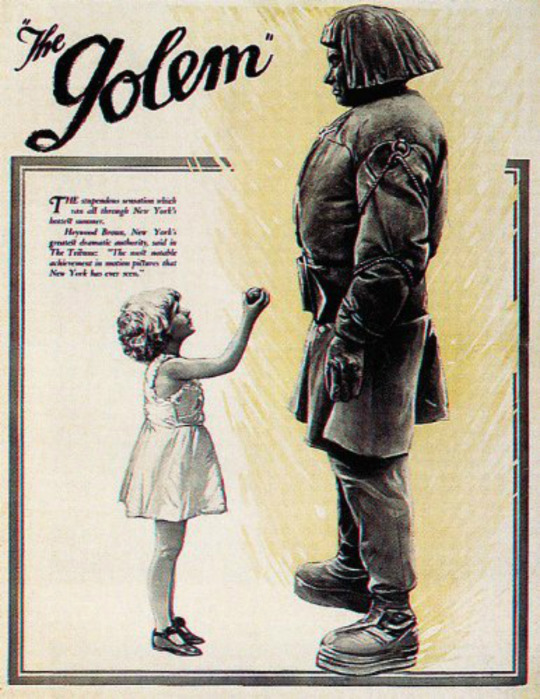
Though THE GOLEM: HOW HE CAME INTO THE WORLD represents an important beat in the development of German expressionist cinema, and any self-respecting nerd has seen plenty of beguiling stills from it, not as many people know it well enough to discuss it on the level that NOSFERATU or THE CABINET OF DR. CALIGARI enjoy. This is surely relatable to availability issues—in fact, the film is part of a trilogy, along with 1915's THE GOLEM and the 1917's THE GOLEM AND THE DANCING GIRL (apparently a primordial example of a horror-comedy!), but these other two are lost to time. The 1920 release, which I'll call DER GOLEM for convenience's sake, is the result of director and star Paul Wegener's desire to update his first effort, which was compromised by a number of disappointing production problems. So, it seems that if we can only have one of his Golem movies, it may as well be this one.
DER GOLEM is the collaboration of writer-director Wegener, his co-writer Henrik Galeen (see also: NOSFERATU), and his co-director Carl Boese, who I assume was especially necessary as Wegener himself plays the title role. The film is adapted from a novel by Austrian author Gustav Myer, which is further based on a Jewish folk tale, and it is interesting to see how this Germanic creative team express their impressions of the history of Jewish persecution. Some critics have found antisemitic underpinnings in the film, largely due to the (delightfully) frightening depiction of the esoteric practice that activates the Golem (which may have a deeper meaning than is immediately apparent), but that would be throwing the baby out with the bathwater. Despite the film being rather brief and broad, it is full of complex, sympathetic characters who transform significantly as the narrative unspools.
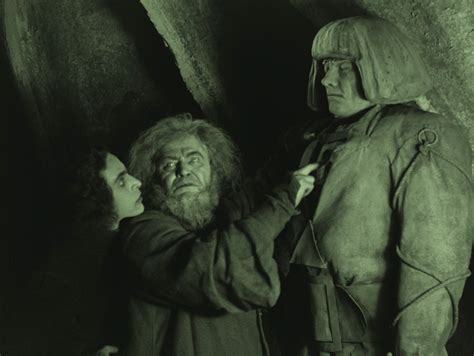
The story takes place in the Jewish ghetto of medieval Prague, where the venerable Rabbi Loew (Albert Steinrück) reads a warning in the stars predicting an imminent danger to his people. Sure enough, an edict comes down from the Holy Roman Emperor (Otto Gebühr) condemning the Jews for their evil character, and ordering their expulsion from the region. Loew creates a hulking clay protector who is brought to life by a sacred word hidden in a star-shaped talisman lodged in his chest, and thinks to impress and entertain the Emperor with his abilities in order to ameliorate the situation. The Golem makes a big splash in the Emperor's court, but the Rabbi's other demonstration doesn't go so well; he implores his audience not to laugh or speak during a magical cinematic projection of the history of the Jewish people, but they can't contain themselves, and the palace begins to crumble. When they are saved by the Golem, the Emperor gratefully rescinds his edict.
Now, this may be enormously crass of me, but I really, deeply think it would be incredibly great if Alamo Drafthouse made one of their pre-show warnings out of this scene. DON'T TALK. DON'T TEXT. OR THE GOLEM WON'T SAVE YOU FROM THE SUPERNATURAL DESTRUCTION OF YOUR EMPIRE.

The other thing I'd like to casually note about this first section, just because it's something I happen to know a little bit about, is that Rabbi Loew's invocation of the goetic demon Astaroth is not really equatable with the idea of devil worship that some viewers have extracted from this—which is fair, because this isn't easy to understand, nor is it readily accessible information. But (and I'm speaking very colloquially here) Astaroth is said to have mastery over esoteric knowledge, and one would work with him in order to gain more occult (for lack of a better word) enlightenment; so, it makes sense that he gives Rabbi Loew the sacred animating word. The other thing about working with demons is that they represent some set of what are usually considered to be negative characteristics: say, slander, wrath, vengeance, etc. So you might work with one of them to deflect these archetypal energies if they are directed at you by someone else. But, you'll also want to be prepared to address these elements in a mature and intelligent way, lest you be overtaken by them yourself. The final effect would be that you've learned an important lesson, and can't be harmed or dominated by whatever malefic characteristic you're dealing with.
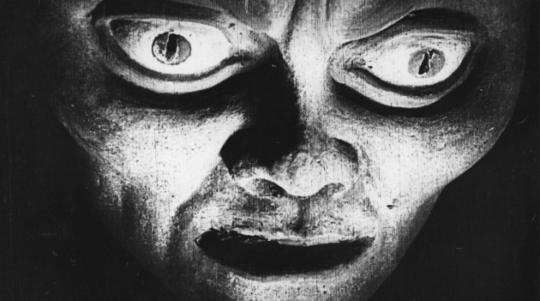
Once the Golem has served its purpose in averting the persecution of the Jews, Loew receives a warning that Astaroth may take it over and use it for vengeful violence. Loew wisely deactivates the creature, but while he goes out to join in communal celebrations, his Assistant makes a big mistake. (The Assistant is played by Ernst Deutsch, a Jewish actor and athlete who I just saw a couple days ago in ISLE OF THE DEAD! I didn't make a note of his wonderful performance as the gently cynical doctor in that film, and now I'm sorry about it) He has fallen in love with the Rabbi's daughter Miriam, and is appalled when he discovers her affair with the Emperor's arrogant squire Florian (Lothar Müthel). The Assistant sets the Golem on Florian, but of course the situation spins out of control, forcing Rabbi Loew to save the community once again.
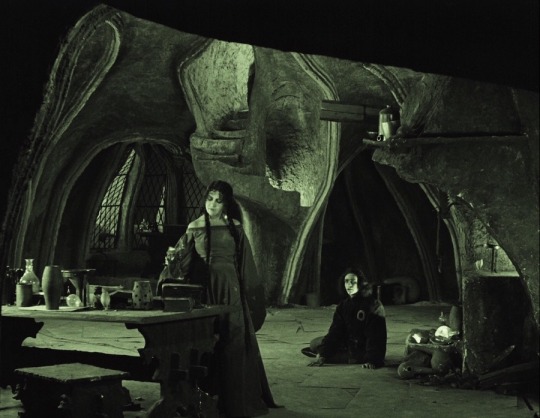
The Golem is an obvious ancestor of Frankenstein's monster, and his misadventure is startlingly similar to that of the better-known creature. Paul Wegener's expressive performance evokes the same range of anger, fear, and naive desire, and his moving interaction with an innocent child is abundantly familiar. In general, DER GOLEM is competitive with FRANKENSTEIN in its emotional complexity; even its villains are tragically human, driven at first by selfish compulsions, but faced with the consequences of their actions, they are sincerely penitent. Even the basics of antisemitism are addressed handily in the film, as the Jews' spartan existence in the ghetto, where their greatest treasures are their traditions and sense of community, flies in the face of the Emperor's accusation that they are avaricious and materialistic. (This coming down from a man bedecked in finery sitting on a gleaming throne, naturally)
The principle gift of DER GOLEM is its advanced aesthetics, owing to the fine work of master cinematographer Karl Freund and architect Hans Poelzig. But the film is bigger than its contributions to film history, telling a sensitive tale that is still surprising in its depth and thoughtfulness. I was glad to see there are new blu ray releases of the film from the last few years, and I'm excited to get my hands on one.
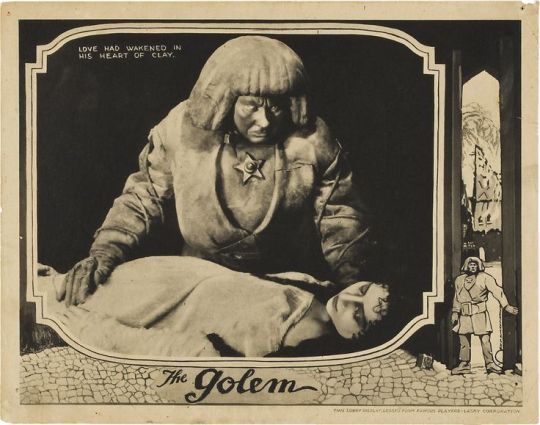
#blogtober#blogtober 2022#golemania#the golem: how he came into the world#der golem: wie er in die Welt kam#paul wegener#carl boese#karl freund#henrik galeen#gustav myer#Albert Steinrück#Otto Gebühr#Ernst Deutsch#Lyda Salmonova#horror#folk horror#german expressionism#hans poelzig#supernatural#occult#esoterism#frankenstein#religion
8 notes
·
View notes
Text
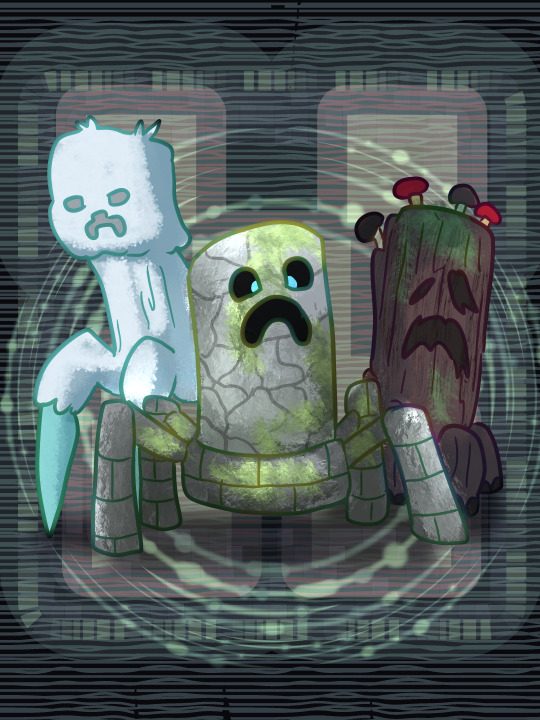
Mo' Creepers
based the cobblestone creeper off the cobblestone golem from the golemania mod and the snow and log creepers from creeper extensions 1 and 2.
12 notes
·
View notes